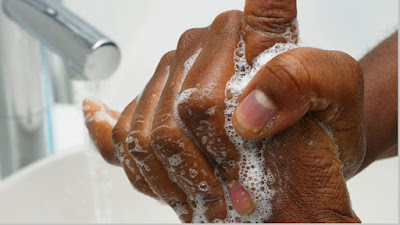You can find here all kinds of health tips and solution of health problems.
Sunday, October 14, 2018
Wash Your Hands For Infection Control
As Global Hand washing Day is observed tomorrow, proper hand hygiene has been described as one of the most important infection control activities.
Scientific evidence supports the observation that if properly implemented, hand hygiene alone can significantly reduce the risk of cross-transmission of infection in healthcare facilities.
Dr. Ijeoma Agbo, a Public Health Physician with Save the Children International, a non-governmental organisation, said washing of hands with soap is very important in preventing diarrhoea and other diseases, especially those with faeco-oral (from faeces to mouth) mode of transmission.
She explained that when hands are properly washed with soap, under running water and by vigorously rubbing hands together, pathogens that cause diseases are mechanically removed and contaminating fungi inhabiting the hands are chemically killed.
She said: “Washing of hands is very important, especially in children because they are very playful, they go to school and play around. Therefore, it is very easy for them to pick up germs. We advise children to wash their hands after using the toilets. We teach them to wash their hands before and after eating food. We teach them to tell their mothers at home to wash their hands after changing diapers for their babies, because most mothers, after changing their babies’ diapers, prepare food for the family without washing their hands. In the process, they transmit germs to the family.”
She noted that in the 2015 United Nations Children Fund (UNICEF) report, about 750, 000 Nigerian children die before their fifth birthday and diseases implicated include those that can be prevented by hand washing.
Agbo said: “These include diarrhoea, which is the second most common cause of death in this age group. Other diseases that can be prevented by proper hand wash include common cold, conjunctivitis, typhoid fever, hepatitis A and pinworm infection. This underscores the importance of hand washing in maintaining good hygiene, health and wellbeing.
“It is important to note that washing hands with soap is not the only means of preventing diarrhoea. Access to clean and potable water, good sanitation, adequate nutrition and vaccination with Rotavirus vaccine are also proven ways of averting sickness and deaths due to diarrhoea. Thus, while the people play their role by ensuring good hygienic practices, government at all levels must continue to ensure adequate and clean public water supply, strengthen immunisation programme, especially by keeping to national plan of introducing Rotavirus vaccine into routine immunisation schedule in 2018.”
She explained that proper hand washing could reduce up to 30 percent episodes of diarrhoea and a little less proportion of respiratory tract infections.
“However, despite various awareness and sensitisation programmes, many Nigerians do not wash their hands appropriately, and frequently,” she said. “The reasons for this is complex and include lack of access to clean water and soap, cultural practices, religious beliefs, unawareness of its benefits and lackadaisical nature to issues of good hygiene. Most people only wash their hands before eating and in the customarily improper way of jointly dipping their hands in a bowl of water.
“This hand-washing approach of joint dipping of hands in a bowl can transfer, rather than prevent diseases. The best way to wash your hand is by applying soap, vigorously rubbing both hands and washing the soap off under running water.
“It is sad to note that after Ebola virus disappeared from Nigeria, most of the water sinks and soap placed at public places, such as schools and offices, have also disappeared or left unattended. What is required is a positive attitudinal change towards good hygienic practices and realisation that just as in the days of Ebola virus, hand washing can still prevent many deadly diseases.
“With about 10 percent of deaths in under-5 Nigeria children linked to diarrhoea, according to the same 2015 UNICEF report, about 75, 000 Nigerian children die annually due to diarrhoea, which translates to more than 200 children dying daily due to same disease. This is as tragic as one local airline filled with children crashing every day in Nigeria, without a survivor, when about 30 percent of these children can be saved by proper hand washing with soap.”
Former President, Association of Resident Doctors in Lagos University Teaching Hospital (LUTH), Dr. Omojowolo Olubunmi, said regular and proper hand washing is perhaps the most important and effective public health means of preventing the spread of diseases.
He added that many communicable diseases, such as cholera, typhoid fever and poliomyelitis, among others, are transmitted via the faeco-oral route. Regularly washing hands with soap and water is the best way to reduce the number of germs in most situations.
Source: guardian.ng
Subscribe to:
Post Comments (Atom)

No comments:
Post a Comment